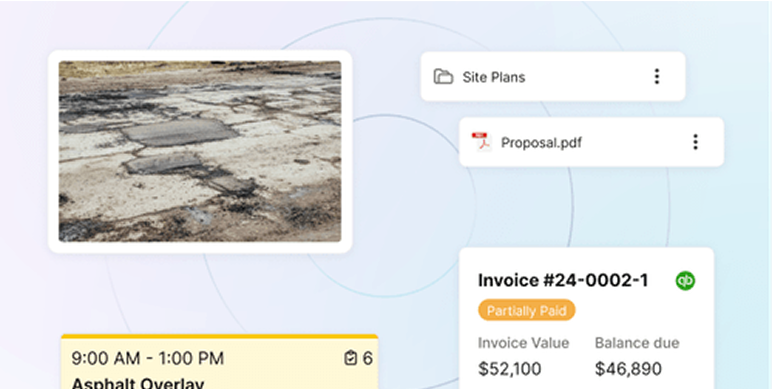Asphalt Testing: Methods, Equipment, and Why It Matters
Your crew lays fresh pavement, but weeks later, cracks start spreading. Or worse, a DOT inspector pulls cores and flags your compaction as failing. Every paving contractor knows the frustration.
Asphalt testing prevents those headaches by verifying mix quality, compaction, and performance before problems appear. DOTs require it, labs specialize in it, and contractors rely on it to avoid costly rework.
In this guide, you’ll learn what asphalt testing involves, the methods used, and the essential asphalt testing equipment that keeps jobs on spec.
What Is Asphalt Testing?
Asphalt testing is the process of measuring and analyzing asphalt mix and pavement properties to confirm that they meet design standards and job specs. It’s how inspectors and contractors know whether a project has the right density, thickness, and durability.
Why does asphalt testing matter?
Asphalt pavement typically fails early when testing gets skipped or results are ignored. Testing protects contractors from penalties, keeps projects compliant with AASHTO and ASTM standards, and provides proof of quality to owners.
Who uses asphalt testing results?
- Contractors: Verify compaction and material quality to avoid costly rework
- Labs: Run specialized tests with controlled equipment
- Inspectors: Confirm that crews meet DOT or municipal requirements
- DOTs: Enforce quality specs and protect taxpayer-funded infrastructure
Note: For related insights, check our posts on asphalt maintenance.
Types of Asphalt Testing
Asphalt testing includes several methods, including asphalt core testing and compaction testing. Each test is designed to measure different aspects of pavement performance. Here’s a breakdown of the most common types:
Asphalt core testing
Asphalt core testing involves drilling cylindrical samples from the pavement to measure density, thickness, and voids.
Crews cut cores with a drill, extract them, and send them to a lab. Results confirm compaction and identify weak layers. Contractors often face job delays if cores fail density specs.
Compaction and density tests
Compaction and density tests measure how tightly asphalt particles are packed. Crews often use a nuclear density gauge, but non-nuclear options like electromagnetic probes are becoming common.
Density directly ties to durability: Under-compacted asphalt increases air void content, which has been shown to accelerate pavement cracking, rutting, oxidation, and ultimately shortens pavement service life.
Asphalt Rice Test
The Asphalt Rice Test determines the theoretical maximum specific gravity of a mix. Labs compare Rice numbers to in-place density to check compaction efficiency. Contractors rely on it for quality control and to calculate void content.
Note: See our full guides on the Asphalt Rice Test and Asphalt Rice number.
Performance & durability testing
Performance testing predicts how asphalt will hold up under real-world conditions.
- Rutting resistance: Measures how mixes resist permanent deformation
- Fatigue cracking: Evaluates resistance to repeated traffic loads
- Low-temperature cracking: Make sure pavement doesn’t fail in cold climates
Other Common Tests
Beyond the core methods, crews and labs run additional checks to prevent failures:
- Moisture susceptibility: Determines how water weakens the bond between asphalt and aggregate.
- Asphalt binder testing: Evaluates binder grade, viscosity, and temperature performance.
- Permeability: Measures how much water flows through the pavement, a key factor in freeze-thaw regions.
Note: Learn more about sustainable practices in our guide to asphalt recycling.
Asphalt Testing Equipment
Lab vs. field equipment
Lab equipment provides precision, while field equipment provides speed. Field devices like density gauges let crews test on the jobsite and make adjustments in real time. Labs run advanced tests with controlled equipment to deliver certified data that DOTs accept.
A balance between both is essential; quick checks in the field keep production moving, and lab reports provide the documentation needed for final approval.
Core drills, saws, and extractors
Core drills cut cylindrical samples from pavement for lab testing. Hydraulic or electric drills are mounted to the surface and cooled with water during cutting. Once extracted, diamond-blade saws trim samples to the correct size for density or thickness measurements.
Extractors then remove asphalt binders from aggregates for gradation analysis. Together, these tools create the physical samples that validate compaction, thickness, and mix quality.
Density gauges
Density gauges measure in-place compaction directly on the pavement surface:
- Nuclear density gauges use radiation to measure density and moisture content. They’re fast and reliable, but they require strict federal and state licensing, operator training, and certification in radiation safety. Specific requirements and procedures for legal operation vary by jurisdiction.
- Non-nuclear gauges use electromagnetic probes. They avoid regulatory hurdles but require calibration against cores to ensure accuracy.
Crews use these gauges multiple times per day during paving, making them some of the most frequently deployed pieces of asphalt testing equipment.
Rice Test equipment
Rice Test equipment determines the theoretical maximum specific gravity of asphalt mixes. Labs use specialized bowls, vacuum pumps, pycnometers, and balances to run these tests.
Accurate Rice numbers provide the baseline for compaction comparisons and void calculations. Without precise Rice equipment, density results lose their meaning.
Advanced performance testers
Advanced performance testers simulate how asphalt behaves under real-world stresses. Devices like wheel tracking systems evaluate rutting resistance. Fatigue testers bend asphalt beams repeatedly to measure cracking potential.
Thermal chambers test how mixes handle freeze-thaw cycles and low-temperature cracking. These machines help owners and agencies select mixes that last longer under traffic and climate stress.
Where to buy or rent
Contractors and labs typically buy or rent asphalt testing equipment from suppliers like GlobalGilson and Humboldt, both of which provide everything from basic core drills to advanced performance systems.
Some contractors rent high-cost lab devices for short projects, while most own field gauges and coring equipment for daily use.
Standards and Regulations in Asphalt Testing
Asphalt testing follows strict standards:
- ASTM International publishes widely used asphalt test methods (see ASTM standards).
- AASHTO provides highway-specific procedures (see AASHTO standards).
- DOT and municipal requirements specify which tests must be performed on public projects.
Remember: Compliance matters because contractors risk rejected work and financial penalties if testing falls short.
What Are the Biggest Challenges in Asphalt Testing?
The biggest challenges in asphalt testing involve accuracy, outdated data, and unpredictable field conditions. Contractors often deal with the consequences, even when they don’t run the tests themselves.
Understanding these challenges helps crews plan ahead and avoid failed inspections.
Common failures and misreads
Misreads happen when crews rely on improperly calibrated gauges or cut poor-quality cores. For example, a nuclear density gauge that hasn’t been zeroed correctly can show a failing density when the compaction is actually acceptable.
Cores cut with dull bits may fracture, which lowers measured density and creates the appearance of voids that don’t exist.
Contractors lose time and money when inspectors question these results. Every re-test adds delays, shifts schedules, and can even stop production. Training field staff on proper handling and ensuring labs follow AASHTO and ASTM procedures is critical to reducing misreads.
Issues with outdated Rice numbers
Relying on outdated Rice numbers is one of the most common mistakes in asphalt testing. Each mix design has its own theoretical maximum specific gravity, and that number changes with new aggregate sources or binder batches.
When crews compare compaction against an old Rice value, the density results become meaningless. The risk is twofold:
- Passing material may fail on paper, forcing unnecessary rework.
- Poor compaction may pass because the benchmark was wrong.
Labs and contractors must keep Rice Tests current for every mix design used on a project. Skipping this step creates disputes with inspectors and owners that often end in penalties.
Environmental factors (temperature, moisture, wind)
Environmental factors cause some of the toughest challenges in asphalt testing. Pavement cools quickly in windy conditions, making it harder to achieve density before the mat stiffens.
Rain or surface moisture can skew nuclear gauge readings by inflating measured density. Hot, humid days affect compaction rates and change how quickly crews need to work.
These conditions impact placement and alter test results. A core drilled from pavement compacted at the wrong temperature may crack, reducing measured density. Inspectors may also require retests when weather interferes with accuracy.
Contractors need to account for these variables in both paving operations and testing schedules.
The bottom line: Testing challenges rarely come from the equipment itself. They come from human error, old data, and unpredictable site conditions. Crews that prepare for these issues stay on schedule and avoid costly penalties.
Summing up
Asphalt testing protects contractors from costly rework and penalties by verifying density, thickness, and durability meet specs. Core testing, compaction gauges, and Rice tests are your frontline defense against failed inspections.
The key is balancing quick field checks with certified lab analysis to keep production moving while documenting compliance with AASHTO and ASTM standards. Most testing failures stem from incorrectly calibrated equipment, outdated Rice numbers, or environmental factors like wind and moisture, not the pavement itself.
Smart paving contractors train crews properly, keep Rice values current for each mix design, and plan around weather conditions to avoid delays and disputes with inspectors.
How OneCrew Helps Contractors Stay Ahead
Even if paving contractors don’t perform asphalt testing directly, a failed density test can delay a job, trigger penalties, or damage relationships with owners. It’s not just the test itself that matters, but how the data is stored, tracked, and applied. That’s where OneCrew comes in.
OneCrew helps contractors by:
- Storing test results and inspector notes by project. Crews no longer lose paperwork or emails; all quality data stays tied to the job record.
- Tracking delivery times, compaction zones, and crew shifts. Contractors see how mix deliveries align with rolling patterns and crew activity, making it easier to spot problems before inspectors do.
- Keeping jobs on spec to avoid penalties. By tying testing data into project management, OneCrew gives teams the context they need to stay compliant with DOT and municipal requirements.
- Connecting field and office workflows. Data captured in the field links directly to estimates, scheduling, and invoicing inside the same platform, eliminating the risk of information falling through the cracks.
Why this matters: Testing data only creates value when it’s tracked and used. Most contractors juggle spreadsheets, whiteboards, and multiple apps that don’t connect.
OneCrew consolidates everything into a single platform built for paving contractors, making it easier to manage specs and prove compliance. Book a free demo to see how OneCrew helps paving contractors stay organized, track specs, and avoid costly failures.
FAQs
1. What is the Rice Test in asphalt?
The Rice Test in asphalt is the theoretical maximum specific gravity test. Labs use it to measure the maximum density of a mix without air voids. Contractors compare this value to in-place density to evaluate compaction and calculate void content.
2. Why is asphalt density important?
Asphalt density is important because it determines pavement strength and durability. Under-compacted asphalt leaves air pockets that allow water and traffic to break down the surface early. Meeting density specs ensures long-lasting performance.
3. Who performs asphalt testing, contractor or lab?
Both contractors and labs perform asphalt testing. Contractors run quick field checks with density gauges, while certified asphalt labs handle core testing, Rice numbers, and advanced performance testing. DOTs and inspectors rely on both sets of results to confirm compliance.
4. How often should asphalt be tested?
Asphalt should be tested throughout the paving process. Crews take density readings during placement, cores after compaction, and lab tests as required by project specifications. Regular testing prevents problems from slipping through to the final surface.
5. What causes asphalt compaction test failures?
Asphalt compaction test failures come from poor rolling technique, improper temperature, or using outdated Rice numbers. Environmental conditions like moisture and wind also affect results, so crews must adjust rolling and testing practices in real time.
6. Can a platform help manage asphalt testing results?
Yes, a platform can help manage asphalt testing results. OneCrew, for example, lets contractors store test data by project, track compaction and delivery records, and keep every job compliant without chasing paper records.


